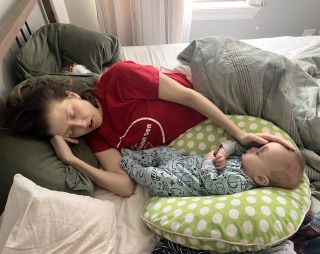KEY POINTS
- Talking about cancer as a "war" or a "battle" could be hurtful.
- It is not helpful to suggest "causes" to patients when the causes are uncertain or unknown.
- Cancer is invariably a difficult illness, so avoid using the language of effort, valor, and virtue.

My precious daughter Laura recently died from stage 4 colorectal cancer after nearly a year of travelling on a horrifically tragic journey. The initial joy of expecting her first baby at the age of 39 was slowly and systematically displaced by ever worse news. First, an abnormal blood test result required follow up evaluation; then came the news that there was colorectal cancer; and shortly thereafter the news of metastasis to Laura’s liver: The cancer was already stage 4 and life threatening.
Because of this, Laura's baby had to be delivered quite early to transition from “baby friendly” chemotherapy to much more aggressive treatments. Although it was absolutely wonderful watching the unbounded joy Laura always showed when taking care of her baby first in the NICU at Johns Hopkins and then at home, it was nonetheless heartbreaking watching how much physical pain she was in and how sick the cancer treatments invariably made her feel. I will always admire Laura’s heroic dedication to her son, her husband, and her extended family even as her own health was failing. This dedication was also reflected in working literally until the week before she died to ensure that the students that she supported as the director of graduate studies in the Department of Epidemiology at Johns Hopkins University were taken care of during their educational journey and career development—despite how much she herself was suffering.
AfriPrime App link: FREE to download...
Perhaps the most heartbreaking aspect of the journey, and one that I would trade my own life for without hesitation, is that Laura did not have the chance to raise the son she waited so long for and so joyously looked forward to raising. This story unto itself is noteworthy in the context of the dramatic increase in colorectal cancer and deaths from colorectal cancer in relatively young people in recent years in the US, and the grief parents like us have when their children die under tragic circumstances. I do sincerely hope that the data, and the lessons learned from Laura's diagnosis and treatment, will benefit future colorectal cancer patients in her age cohort to have a better chance at surviving.
But I wish to highlight another aspect of this story that may merit broader reflection in medical circles and in the wider society. In her last days, Laura wanted me and other family members and close friends to know that she had done the best she could to “fight” the cancer. I was profoundly taken aback by this sentiment because no one who had accompanied her to treatments that left her desperately ill for days on end or had heard her cry out in pain at all hours of the day and night could have any doubt whatsoever of her herculean efforts to live for her son, her husband, her family, and her friends. I hated the idea that Laura in any way entertained the thought that “losing” her “battle” to cancer was in any way due to some failing on her part. I recall taking her to treatment in Fairfax, Virginia, stopping the car on the way home several times while she vomited, and the stress and anxiety she endured during the treatment knowing that it would make her violently ill. How could anyone possibly try harder?
My discussions with Laura also revealed that well-meaning but misguided acquaintances had sent articles and popular literature on the “causes” of the increase in colorectal cancer in young people. These included eating the wrong kinds of foods, not taking the right kinds of vitamins, getting vaccinated for COVID-19, and many other unsubstantiated theories. We did have a good laugh about the COVID-19 vaccination-colorectal cancer “connection” because the increase in colorectal cancer among people less than 50 years of age started years before the COVID vaccines were even developed. Nonetheless it was clear to me that articles and information suggesting that somehow Laura could have done something to prevent colorectal cancer a priori was hurtful to her despite being well intended.
There seems to be a human need to find fault with anyone whom misfortune overtakes. In one of the all-time tragic stories, the biblical book of Job describes how elders in the community came to Job and argued that he must have done something wrong to cause his personal afflictions and the tragedies that befell his family. They told him, “How can any mortal be blameless,” and, “The wicked is in torment all his days, and limited years are in store for the ruthless,” directly implying that Job somehow “deserved” the unfortunate events unfolding in his life. Without debating the theology of Job, there seems to be a foundational human belief that when tragedy strikes, somehow the person the tragedy visits was directly or indirectly responsible for the calamity.
To be sure, human history and modern medicine, including my daughter's field of epidemiology, suggests that some behaviors, such as smoking, can be associated with an increased risk of illnesses such as cancer. On the other hand, there are many illnesses, including colorectal cancer, wherein there are currently more questions than there are answers. There is no way of knowing why Laura got sick. Speculating on this with our current state of knowledge is hurtful—and frankly cruel. It can only have added to her already immense mental burdens and pain.
A related difficulty is that the very language surrounding cancer and cancer treatment implies that virtue and personal effort will contribute to “victory.” There are many articles about “the war on cancer,” individuals “beating” cancer and others losing their “battle," as if this were some form of athletic competition. Perhaps as Laura's journey evolved and it became clear that the treatments were not working as hoped, the idea if she somehow had “tried harder” to “fight” she could have “beaten” the cancer added additional psychological burdens and doubt to her already difficult situation. Again, I worry that that this adversarial “war”-oriented semantic framing can be deeply hurtful in all too many cases, including Laura's. I promise you that she did everything possible to live in the hopes of spending more time with her baby and that she wanted desperately to watch him grow up and nurture him along the way as only a mother can.
To say that Laura “lost” her battle with cancer is akin to saying that someone drowning after being caught in a rip tide “lost” their battle with the ocean. Or that a pedestrian mowed down by a drunk driver “lost” their battle with an automobile. In medical terms, this is also akin to saying that a patient lost their battle with an aneurysm in their brain or to a ruptured aorta in their heart. Such ideas are patently ridiculous. But this is the language that is invariably used when talking about cancer. It is my hope that one of Laura's legacies will be a dialogue about reframing how all of us think about—and talk about—cancer. It is the least we can do to honor the “losers” in this “battle,” like Laura, so that their last days are not afflicted with any doubts about whether they “fought” hard enough or were sufficiently virtuous or valorous. I miss Laura so very much and treasure every moment I spent with her.
AfriPrime App link: FREE to download...


